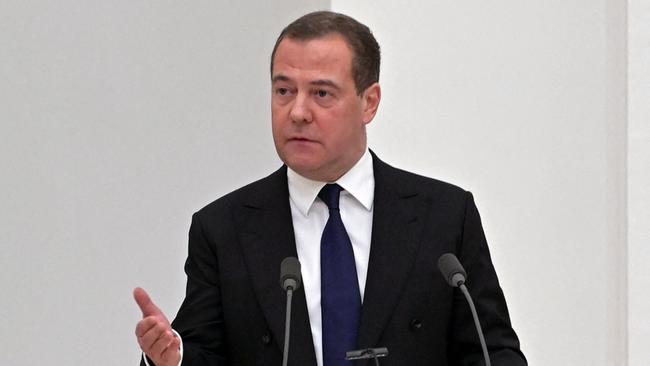You will pay for cancelling gas pipelines, vows Russia
Germany’s decision to halt the Nord Stream 2 gas pipelines from Russia prompted praise from its allies, and an ominous threat from Moscow.

Germany’s decision to halt the Nord Stream 2 gas pipelines from Russia prompted praise from its allies, and an ominous threat from Moscow.
Two hours after the announcement, Dmitry Medvedev, the deputy head of President Vladimir Putin’s security council, warned Europeans that their gas prices would double “very soon”.
It crystallised why Berlin had been reluctant to stop the project. The twin Nord Stream 2 pipelines, built to carry up to 55 billion cubic metres of natural gas a year along the floor of the Baltic Sea, were completed last northern summer against the strident objections of many of Germany’s neighbours.
Allies such as the US, Britain and Poland had castigated Germany’s reliance on Russian gas, described by Boris Johnson last week as a “hypodermic drip feed”, and its supposed indifference to the risk of undermining Ukraine by establishing an alternative route for Moscow to pump the fuel into central and northern Europe.
Yanking out Nord Stream 2, the newest of those needles, is likely to hurt. It is not just that Germany is forgoing enough gas to meet at least a third of its rapidly expanding needs: Russia has all the instruments to inflict a considerable amount of pain on German households, and by extension to create a political headache for Olaf Scholz, the Social Democratic Chancellor.
Medvedev’s threat that European gas prices would exceed euros €2000 ($3100) per 1000 cubic metres, a little over twice their present level, was anything but idle.
Germany gets just over half its gas from Russia, by way of the original Nord Stream pipeline under the Baltic, the Yamal pipeline through Belarus and Poland and the Transgas network through Ukraine and central Europe.
Until now German consumers have been shielded from the turmoil on the European gas exchanges by their energy suppliers’ contracts with Russia.
Last week Putin noted Russia’s commitment to “honouring” these contracts had suppressed prices to between a fifth and a third of the normal market rate. The implicit threat was a huge increase in energy bills if Berlin misbehaved: Moscow could renege on the contracts or further constrain the flow of gas to the West.
Medvedev did not pluck the €2000 figure out of thin air. During a supply crunch before Christmas benchmark prices in Europe briefly rose above €2200 per 1000 cubic metres.
For Scholz’s coalition government, whose approval ratings are flagging, in part because of the rising cost of living, a gas price surge could be excruciating.
Germany is not the only European country with this problem – some of the Baltic states still rely on Russia for three quarters of their gas.
Berlin, however, is caught in a unique trap of its own making. For the best part of two decades successive governments have based their energy policies on the availability of affordable Russian gas.
In the early 2000s Gerhard Schroder, the SPD chancellor, ushered in the Nord Stream project and laid much of the ground for its successor while announcing a retreat from nuclear power. He now earns his crust as chairman of Rosneft, the Russian state energy conglomerate, and as head of the shareholders’ committee at Nord Stream.
Angela Merkel not only defended Nord Stream 2 and embraced Schroder’s exit from atomic energy, but also approved the sale of Germany’s largest gas storage facility to Gazprom, Rosneft’s sister company, before brokering a deal for her country to pull out of coal.
On Merkel’s watch, Germany, unlike most of its neighbours, did not get around to building any terminals to import liquefied natural gas, the most straightforward short-term replacement for pipeline gas from Russia.
Scholz’s coalition promises to generate 80 per cent of electricity from renewables by 2030, and Germany will be even more dependent on gas as a “transitional” fuel.
If anything, Johnson’s hypodermic drip feed remark understated the extent of the problem.
THE TIMES



To join the conversation, please log in. Don't have an account? Register
Join the conversation, you are commenting as Logout